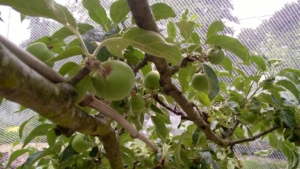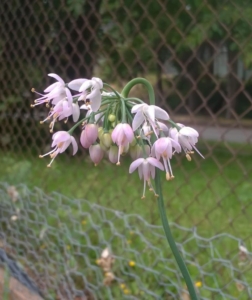State of the Onion – 2023
June 28, 2023
The State of the Onion – 2023
To offer a quick snapshot of the State of the Onion at FECO, we will get the perspective of a few of our residents.
from the voice of the newly hatched Southern Green stink bug ( Nezara viridula), having just crawled out of their egg sacs:
 Day 1. Wow! Look at this place. Wonderful. Nice and cool. So glad we migrated here from the hot and humid South. Look at all these healthy leaves on all these trees. These humans are clearly working toward a diverse population of healthy plants. How exciting to think about devouring them, one by one. We will patiently huddle here, next to our egg sacs, to morph through a few instar stages, before we break loose and forage!
Day 1. Wow! Look at this place. Wonderful. Nice and cool. So glad we migrated here from the hot and humid South. Look at all these healthy leaves on all these trees. These humans are clearly working toward a diverse population of healthy plants. How exciting to think about devouring them, one by one. We will patiently huddle here, next to our egg sacs, to morph through a few instar stages, before we break loose and forage!
for work parties
Sun. July 23, 1-3:30, Ravenna Creek walk
Please email to volunteer
freewayestatescommunityorchard@gmail
Day 3. We are now starting to elongate and we see some orange coloring on each other. To think that we will soon be all green!
Day 5. Slurp … slurp … slurp, slurp, slurp. Wow! something just swallowed us whole. Maybe a katydid, earwig, spider or bird? Diversity in plants leads to diversity in insects and birds! I will have to sign out now; I can feel the enzymes working to break me down.
.
 from the voice of the Flash collard (Brassica oleracea var. viridis), just cut by someone from the weekly food bank harvest crew (homo sapiens).
from the voice of the Flash collard (Brassica oleracea var. viridis), just cut by someone from the weekly food bank harvest crew (homo sapiens).
Not dead yet! Unlike animals, we plants are compartmentalized. My cells are alive! Post-harvest, you can even train me to continue to produce more phytochemicals, including antioxidants, by manipulating light to match my circadian clock!
A volunteer is handling me kindly and sandwiching me with several of my cousins.  I can hear bits and pieces of the volunteers’ conversation. “some peas for volunteers … our family made a curry dip that was perfect for peas … yes, second interview coming up … in order to avoid late blight … you are so clever … (giggling)” The harvest crew are pals and have a great time together on Thursday mornings.
I can hear bits and pieces of the volunteers’ conversation. “some peas for volunteers … our family made a curry dip that was perfect for peas … yes, second interview coming up … in order to avoid late blight … you are so clever … (giggling)” The harvest crew are pals and have a great time together on Thursday mornings.
We collards are tied in bunches and headed into a backpack. I will miss this calm and friendly place. So long!
from the voice of a William’s Pride apple, (Malus domestica), peering out over the north end of the orchard.
 My view is obstructed. Our whole tree is netted. The fruit plant steward decided to opt for ugly trees but good apples. The apple maggot flies (Rhagoletis pomonella) are lurking. For ten years we went unnoticed by her but two years ago some of our ancestors grew up to be ‘spitters’. (The informal name for an apple that is tasted and then immediately spit out.) The larvae of the maggot fly tunnel
My view is obstructed. Our whole tree is netted. The fruit plant steward decided to opt for ugly trees but good apples. The apple maggot flies (Rhagoletis pomonella) are lurking. For ten years we went unnoticed by her but two years ago some of our ancestors grew up to be ‘spitters’. (The informal name for an apple that is tasted and then immediately spit out.) The larvae of the maggot fly tunnel
through the apple, breaking down and rotting the pulp. None of us wants to end up as spitters but still, it’s stuffy in here. We will get enough sun to ripen, but we won’t ‘color up’ well. Netted, we will miss our customary weekly milk bath. I’m nervous that, without our bath, our tree could become infested with powdery mildew (Podosphaera leucotricha). These organic gardeners have to spend a lot of time and effort dealing with pests and pathogens.
———–
A round of applause for our three spokesbeings and their views of the orchard today! In addition to building habitat diversity, community networks, and reducing the impacts of pests and pathogens, we are also involved with a native plant restoration project on NE 60th St. FECO is behind on infrastructure and general maintenance so we are now paying for help and hope to catch up this summer. Finally, we host a Coast Salish Solidarity team that is learning how Western minds have been trained and how different frameworks of thinking and being might improve our relationships with all beings.
Ruth
Some references:
Untitled
http://www.soilcropandmore.info/crops/Insects/Insect-Pictures/Stink_Bugs/Southern_Green_Stink_Bug/text2.htm
Brown Marmorated Stink Bug
WSU September 2017
link – https://treefruit.wsu.edu/crop-protection/opm/brown-marmorated-stink-bug/
Your vegetables are alive — and they change in response to light and dark
Boyd, Jade, 06/20/2013
https://beta.elsevier.com/connect/your-vegetables-are-alive-and-they-change-in-response-to-light-and-dark?trial=true
Postharvest Circadian Entrainment Enhances Crop Pest Resistance and Phytochemical Cycling
D Goodspeed · 2013
https://www.sciencedirect.com/science/article/pii/S0960982213006295




Love this!